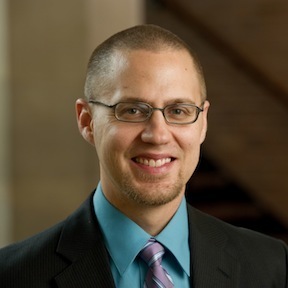An ESTEEM student from Alan Huebner’s statistics class two years ago stayed around Notre Dame after graduation and worked with some professors and graduate students in the College of Engineering on a new type of technology. More recently, the student enlisted Huebner to help the group with some data analysis.

“That turned into a whole new project for me, working with him and these engineers,” Huebner says. “I’ve gotten new projects through my students there. There’s a lot of rewards to be reaped, both for me and the community.”
For Huebner, a Chicago-area native who first planned to be a high school math teacher, engagement with ESTEEM is an enriching dimension of his work at Notre Dame. He came to the Applied and Computational Mathematics and Statistics Department as an assistant professor of the practice three years ago, after earning a Ph.D. at the University of Illinois at Urbana-Champaign and working three years as a statistician for a college entrance exam firm.
In addition to summer and fall statistics classes for ESTEEM students, Huebner teaches undergraduate courses – about two-thirds first-year students, one-third higher-level undergraduates.
“The ESTEEM students are the only graduate students I teach,” he says. “What I aim to give them is practical statistical skills to explain their data sets they might be working with and to make predictions in the future. They’re doing a lot of different things. They’re planning their own business ventures, and they’re also learning about a scientific field with a faculty member here at Notre Dame. I show them fundamental applied statistics. It should help them understand their science, and it should help them analyze their business plans for their startup company.
“They are a group of very, very dynamic, inquisitive, curious students who ask great questions and are actually interested in the material and are not motivated solely by a grade. These ESTEEM students have been successful in their undergraduate careers. Some of them have been successful in industry. They come into the ESTEEM program knowing how to be successful, knowing how to be good students.”